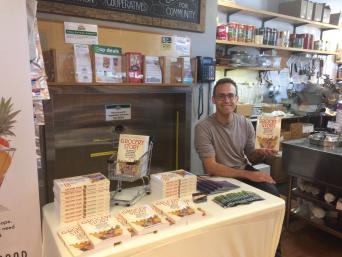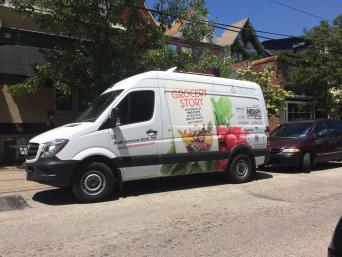
Canadian Author Dives Deep into Big Grocers and Food Co-ops
Jon Steinman has spent much of the past 10-plus years peeling back the layers of the food industry. As host of “Deconstructing Dinner,” a podcast–turned–radio show-turned Canadian TV series that ran from 2006 to 2011, he delved into everything from the chemicals in food to the misuse of “local” to the gritty details behind the production of such staples as pork, honey, tomatoes, and wheat.
About two years ago, Steinman, a native of Toronto and longtime resident of Nelson, BC, switched his format to the printed page and began research on what he calls the food system’s control center: grocery stores. His book “Grocery Story” (New Society Publishers), which came out this spring, features a detailed history on the rise of such behemoths as A&P and Kroger, while touting food co-ops (including Weavers Way) as the antidote to the pricing, marketing, and distribution manipulations of big grocers. He embarked on a book tour in early April, equipped with a white Ford Transit van that featured the “Grocery Story” cover emblazoned on the driver’s side panel.
Steinman is a longtime member of Kootenay Co-op in Nelson and served on the co-op’s board of directors for a decade. He said the book is an effort to connect his earlier research on food systems with the daily or almost daily task of shopping.
“I got to see that there was a significant gap in the conversation, which was grocery stores,” he said during a phone interview in May. “Ninety-two percent of the food we purchase for the home is purchased at food retailers….I looked online to see if any books had been written about the role of grocery stores in shaping the food system, and not one book had been written about that in North America.”
While promoting co-ops as food retailers that also work to engage the community, Steinman also notes how Big Food is chipping away at the pillars that once distinguished co-ops from other grocery stores.
“I think what’s missing within even member-owners of co-ops is a general understanding of what’s happening in the larger grocery store sector, and how that is now impacting co-ops in a very different way,” he said. “Whereas once co-ops operated in somewhat of a niche, along with other natural foods stores and maybe even Whole Foods as being part of an option within the natural, organic foods sector, that’s no longer the case. Co-ops are really competing with some of the largest grocers on the planet, who are carrying many of the same products.”
The stops on Steinman’s tour are either operating co-ops or startups. From his experience, there is a 10-year window that determines whether many co-ops succeed, and one of the challenges is getting past the honeymoon phase and making sure the store becomes part of the community’s shopping routine.
As a shopper, Steinman walks the walk when it comes to supporting his local co-op. After spending several years participating in assorted collectives and CSAs, growing and canning his own vegetables and the like, he’s come to rely on Kootenay for most of his daily food needs. “I’ve definitely found a healthier balance of ‘do it yourself’ and relying on the co-op,” he said.
He’s discovered that the crowds he addresses might believe they’re aware of the various tactics Big Food uses to shut out small, local vendors and keep prices low, but they end up realizing they know less than they thought.
“Often the reaction — even from people who work in co-ops, board directors, managers — is, ‘I had no idea this is what was happening,’ and also, ‘I had no idea how the grocers were really pressuring their suppliers increasingly in the food system, and some of the practices they’re using,’” Steinman said.
The tour, which covers 114 locations ranging from British Columbia to Nashville, will conclude in late November.

